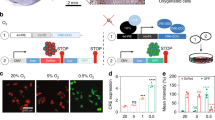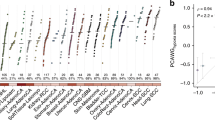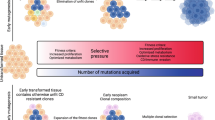Abstract
APOPTOSIS is a genetically encoded programme of cell death that can be activated under physiological conditions1,2 and may be an important safeguard against tumour development3–6. Regions of low oxygen (hypoxia) and necrosis are common features of solid tumours7,8.Here we report that hypoxia induces apoptosis in oncogenically transformed cells and that further genetic alterations, such as loss of the p53 tumour-suppressor gene or over-expression of the apoptosis-inhibitor protein Bcl-2, substantially reduce hypoxia-induced cell death. Hypoxia also selects for cells with defects in apoptosis, because small numbers of transformed cells lacking p53 overtake similar cells expressing wild-type p53 when treated with hypoxia. Furthermore, highly apoptotic regions strongly correlate with hypoxic regions in transplanted tumours expressing wild-type p53, whereas little apoptosis occurs in hypoxic regions of p53-deficient tumours. We propose that hypoxia provides a physiological selective pressure in tumours for the expansion of variants that have lost their apoptotic potential, and in particular for cells acquiring p53mutations.
This is a preview of subscription content, access via your institution
Access options
Subscribe to this journal
Receive 51 print issues and online access
$199.00 per year
only $3.90 per issue
Buy this article
- Purchase on Springer Link
- Instant access to full article PDF
Prices may be subject to local taxes which are calculated during checkout
Similar content being viewed by others
References
Bellamy, C. O. C., Malcomson, R. D. G., Harrison, D. J. & Wyllie, A. H. Semin. Cancer Biol. 6, 3–16 (1995).
Thompson, C. B. Science 267, 1456–1462 (1995).
Harrington, E. A., Fanidi, A. & Evan, G. I. Curr. Opin. Genet. Dev. 4, 120–129 (1994).
Wyllie, A. H. Curr. Opin. Genet. Dev. 5, 97–104 (1995).
Symonds, H. et al. Cell 78, 703–711 (1994).
Deng, C., Zhang, P., Harper, J. W., Elledge, S. J. & Leder, P. Cell 82, 675–684 (1995).
Thomlinson, R. H. & Gray, L. H. Br. J. Cancer 9, 539–549 (1955).
Vaupel, P. W. & Hockel, M. in Tumor Oxygenation (eds Vaupel, P. W., Kelleher, D. K. & Gunderoth, M.) 219–232 (Gustav Fischer, Stuttgart, 1995).
Hockel, M., Vorndran, B., Schlenger, K., Baussmann, E. & Knapstein, P. G. Gynecol. Oncol. 51, 141–149 (1993).
Littlewood, T. D., Hancock, D. C., Danielian, P. S., Parker, M. G. & Evan, G. I. Nucleic Acids Res. 23, 1686–1690 (1995).
Lane D. P., Lu, X., Hupp, T. & Hall, P. A. Phil. Trans. R. Soc.B 345, 277–280 (1994).
Graeber, T. G. et al. Molec. cell. Biol. 14, 6264–6277 (1994).
Lowe, S. W. et al. Science 266, 807–810 (1994).
Lord, E. M., Harwell, L. & Koch, C. J. Cancer Res. 53, 5721–5726 (1993).
Bishop, J. M. Science 235, 305–311 (1987).
Harrington, E. A., Bennett, M. R., Fanidi, A. & Evan, G. I. EMBO J. 13, 3286–3295 (1994).
Lowe, S. W., Ruley, H. E., Jacks, T. & Housman, D. E. Cell 74, 957–967 (1993).
Bardeesy, N., Beckwith, J. B. & Pelletier, J. Cancer Res. 55, 215–219 (1995).
Baker, S. J. et al. Cancer Res. 50, 7717–7722 (1990).
Sinicrope, F. A. et al. Cancer Res. 55, 237–241 (1995).
Bedi, A. et al. Cancer Res. 55, 1811–1816 (1995).
Lotem, J. & Sachs, L. Cell Growth. Differ. 4, 41–47 (1993).
Lowe, S. W. Curr. Opin. Oncol. (in the press).
Hickman, J. A., Potten, C. S., Merritt, A. J. & Fisher, T. C. Phil. Trans. R. Soc. B 345, 319–325 (1994).
Ziegler, A. et al. Nature 372, 773–776 (1994).
Greenblatt, M. S., Bennett, W. P., Hollstein, M. & Harris, C. C. Cancer Res. 54, 4855–4878 (1994).
Hockenbery, D., Nunez, G., Milliman, C., Schreiber, R. D. & Korsmeyer, S. J. Nature 348, 334–336 (1990).
Lowe, S. W., Jacks, T., Housman, D. E. & Ruley, H. E. Proc. natn. Acad. Sci. U.S.A. 91, 2026–2030 (1994).
Dranoff, G. et al. Proc. natn. Acad. Sci. U.S.A. 90, 3539–3543 (1993).
Pear, W., Nolan, G. P., Scott, M. L. & Baltimore, D. Proc. natn. Acad. Sci. U.S.A. 90, 8392–8396 (1993).
Author information
Authors and Affiliations
Rights and permissions
About this article
Cite this article
Graeber, T., Osmanian, C., Jacks, T. et al. Hypoxia-mediated selection of cells with diminished apoptotic potential in solid tumours. Nature 379, 88–91 (1996). https://doi.org/10.1038/379088a0
Received:
Accepted:
Issue Date:
DOI: https://doi.org/10.1038/379088a0
This article is cited by
-
Convergent TP53 loss and evolvability in cancer
BMC Ecology and Evolution (2023)
-
Hypoxic microenvironment in cancer: molecular mechanisms and therapeutic interventions
Signal Transduction and Targeted Therapy (2023)
-
MDM2 inhibitors, nutlin-3a and navtemadelin, retain efficacy in human and mouse cancer cells cultured in hypoxia
Scientific Reports (2023)
-
Evolutionary determinants of curability in cancer
Nature Ecology & Evolution (2023)
-
Brain metastasis in breast cancer: focus on genes and signaling pathways involved, blood–brain barrier and treatment strategies
Clinical and Translational Oncology (2023)
Comments
By submitting a comment you agree to abide by our Terms and Community Guidelines. If you find something abusive or that does not comply with our terms or guidelines please flag it as inappropriate.



